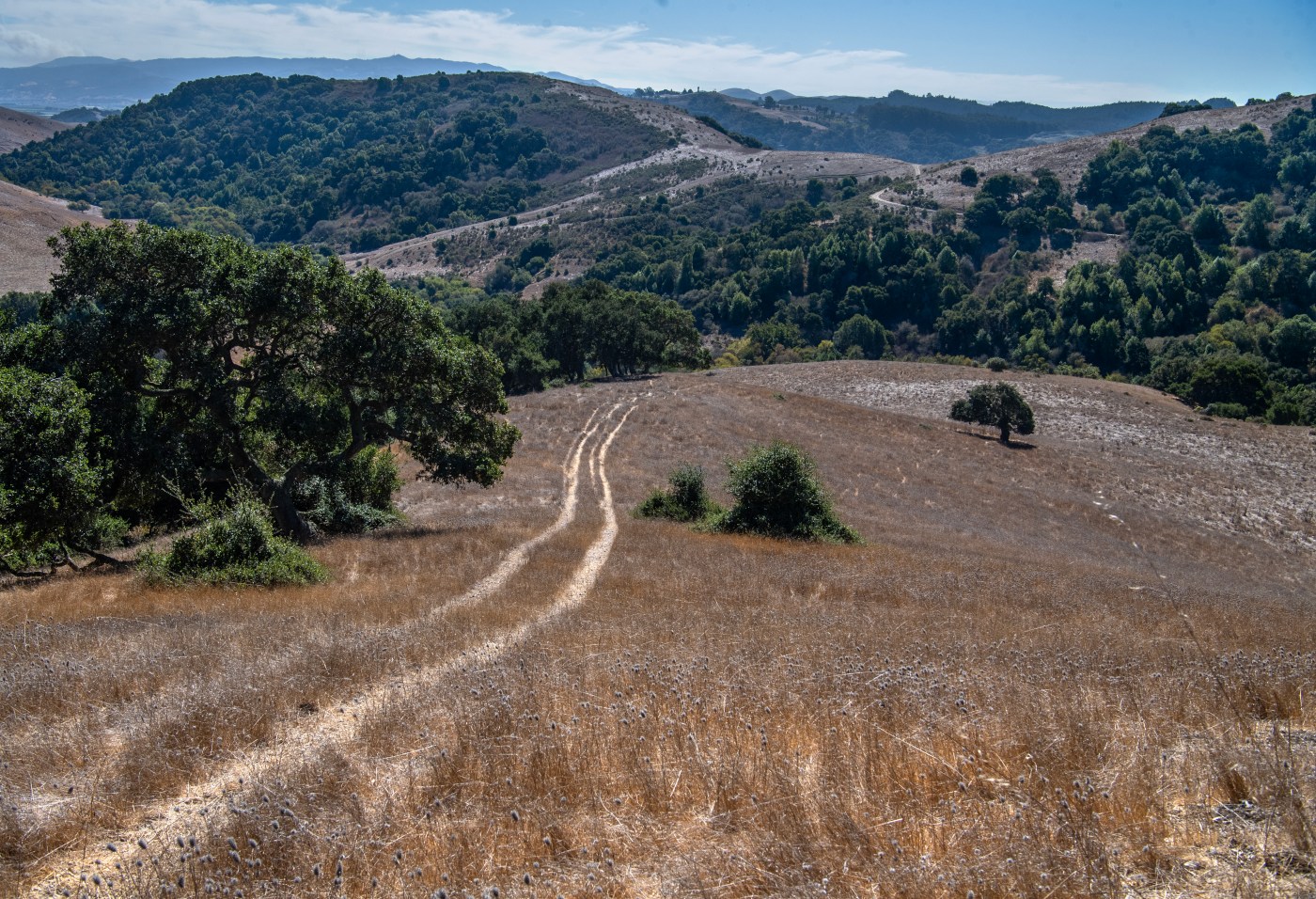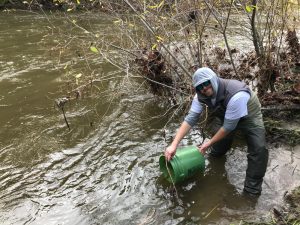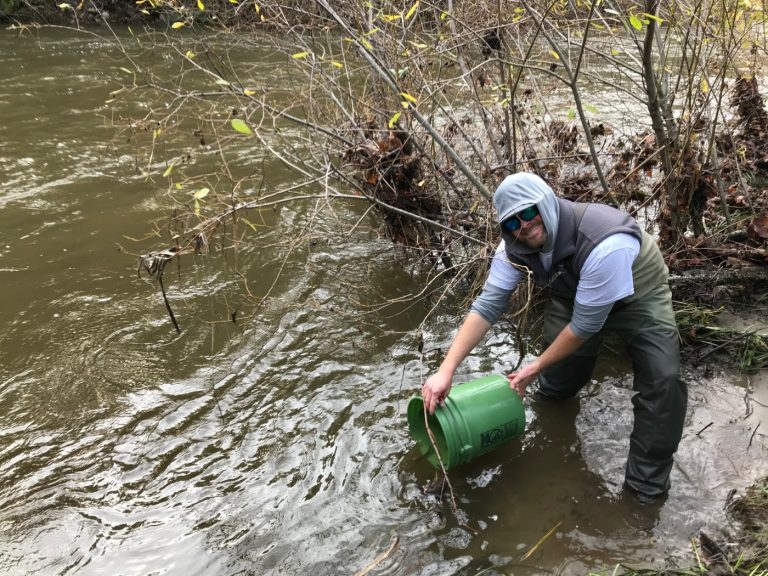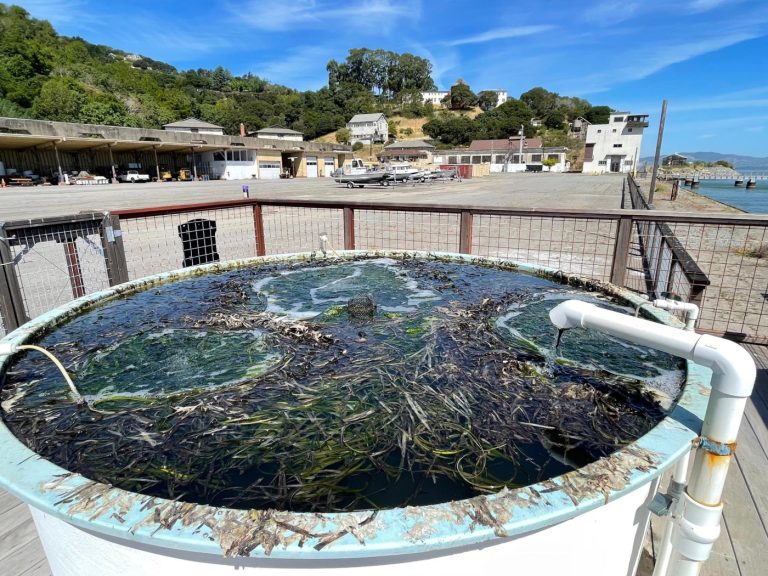For nearly a decade, developers have been trying to build a sand and gravel quarry on Sargent Ranch, a sprawling 6,500-acre property along Highway 101 south of Gilroy with a rich cultural history, extensive wildlife and years of failed development proposals, from golf courses to a casino.
Centered on one of the largest remaining private undeveloped landscapes in Santa Clara County, the quarry has been opposed by environmental groups, multiple city councils including in Santa Clara, Mountain View and Sunnyvale, and the Amah Mutsun tribal band, which previously inhabited the area for thousands of years.
Now in a significant shift, nearly 20% of the original Sargent Ranch will be preserved as open space.
The Peninsula Open Space Trust, a Palo Alto environmental group, closed a $15.6 million deal on Oct. 18 to buy 1,340 acres along Sargent Ranch’s southwestern edges. That property, known as Pescadero Ranch, is a rustic expanse of oak-studded hills, pastures and streams that is 30% larger than San Francisco’s Golden Gate Park.
“It’s an inspirational property. It’s unique and special,” said Ezekiel Schlais, a senior property manager for the land trust, known as POST. “There are a few cattle fences and mildly graded dirt roads. But other than that, it is wild and untouched.”
Ezekiel Schlais, senior project manager for the Peninsula Open Space Trust, stands next to an old oak tree on the Pescadero Ranch south of Gilroy, Calif., on Thursday, Oct. 24, 2024. The trust, a Palo Alto environmental group, purchased the 1,340-acre scenic property along the Santa Clara-Santa Cruz County border for $15.6 million. (Doug Duran/Bay Area News Group)
POST plans to continue grazing cattle on the ranch. It eventually hopes to transfer the land to another owner — a rancher, a tribe, a parks agency or someone else — with legally binding language in the title that it cannot be developed.
What the deal means for the quarry plan on the rest of Sargent Ranch, however, among the biggest land use battles in the South Bay in recent years, is so far unclear.
Sargent Ranch’s long saga
Sargent Ranch is owned by an investor group led by Howard Justus of San Diego. The owners completed a draft environmental study for the quarry project in 2022. Santa Clara County planning officials are still writing responses to more than 10,000 public comments on the plan, nearly all of which opposed it, with the hopes of releasing a final environmental report next year. A vote to approve or deny the quarry by the Santa Clara County Board of Supervisors is expected in late 2025 or 2026.
Justus could not be reached for comment Friday.
But in an interview with the Mercury News in 2019, he said the quarry would provide much-needed sand and gravel for Bay Area building projects, would only affect about 400 acres of Sargent Ranch and that he would be amenable to allowing some public hiking there.
“This is a project that allows for doing well by doing good,” said Justus, managing director of Debt Acquisition Company of America. “We are able to provide a consistent and reliable sand source for the South Bay at a fraction of the carbon footprint and to conserve an incredible piece of property.”
Justus’ group purchased Sargent Ranch in 2013 from Wayne Pierce, a La Jolla developer who tried to build golf courses, hotels, a casino and other projects there, only to file for bankruptcy.
Four years ago, Justus sold 1,340 acres of Sargent Ranch to David Wallace, a Danville investor.
Wallace considered various plans and then agreed to sell to POST.
“Our initial goal was to develop the property in a way that respected the land while simultaneously pursuing the best economic return,” Wallace said in a statement. “But the more time I spent there, the more it became evident that preservation was the only thoughtful path forward.”
The news that a former part of Sargent Ranch will be preserved has buoyed quarry opponents.
“I hope that the owners of Sargent Ranch decide to sell the rest of the land for conservation,” said Alice Kaufman, policy and advocacy director with Green Foothills, a nonprofit environmental group. “It should be obvious to them now that nobody wants this quarry. I hope they decide to cut their losses and realize that Santa Clara County is not interested in having an open pit mine here.”
Kaufman noted that the landscape forms a key route for mountain lions, bobcats, deer and other animals to migrate between the Santa Cruz Mountains, the Diablo Range and the Gabilan Range.
The property also has substantial cultural significance. The Amah Mutsun tribal band and its supporters refer to it as part of Juristac, a roughly 30,000-acre area between Gilroy and San Juan Bautista that was the ancestral home of the Amah Mutsun people for 10,000 years before Spanish explorers arrived in California in the 1700s.
“It is a sacred landscape,” said Valentin Lopez, chairman of the tribal band. “What they are proposing would be like building a sand and gravel mine at the Vatican or Mecca or any other holy site in the world. Indigenous spirituality has never been recognized, respected or protected. But it should be recognized the same as other world religions.”
When the Spanish built missions nearby, natives often fled to avoid cruel conditions, Lopez noted, hiding on Sargent Ranch, in the hills of Pacheco Pass, and other remote locations. The property became a Mexican land grant, and then was purchased by James P. Sargent, a New Hampshire native who came to California with his brothers during the Gold Rush, became wealthy and eventually represented Santa Clara County in the state Legislature from 1871 to 1873.
During the late 1800s, there was a railroad depot, cottages, a hotel, a post office, a saloon and an open-air dance floor near the ranch. The area was a popular spot for vacationers from San Jose and San Francisco, who hunted and had picnics along the nearby Pajaro River.
“When you are in this landscape you feel that you are seeing it as it was hundreds of years ago,” Kaufman said. “You feel that you are seeing wilderness. It’s hard to believe you are close to a massive metropolis of almost 8 million people. It is so important to preserve landscapes like this for future generations.”
A view of the 1,340-acre Pescadero Ranch south of Gilroy, Calif., on Thursday, Oct. 24, 2024. The Peninsula Open Space Trust, a Palo Alto environmental group, purchased the scenic property along the Santa Clara-Santa Cruz County border for $15.6 million. (Doug Duran/Bay Area News Group)
A view of the 1,340-acre Pescadero Ranch south of Gilroy, Calif., on Thursday, Oct. 24, 2024. The Peninsula Open Space Trust, a Palo Alto environmental group, purchased the scenic property along the Santa Clara-Santa Cruz County border for $15.6 million. (Doug Duran/Bay Area News Group)
A view of the 1,340-acre Pescadero Ranch south of Gilroy, Calif., on Thursday, Oct. 24, 2024. The Peninsula Open Space Trust, a Palo Alto environmental group, purchased the scenic property along the Santa Clara-Santa Cruz County border for $15.6 million. (Doug Duran/Bay Area News Group)
A view of the 1,340-acre Pescadero Ranch south of Gilroy, Calif., on Thursday, Oct. 24, 2024. The Peninsula Open Space Trust, a Palo Alto environmental group, purchased the scenic property along the Santa Clara-Santa Cruz County border for $15.6 million. (Doug Duran/Bay Area News Group)
A stately oak tree at the 1,340-acre Pescadero Ranch south of Gilroy, Calif., on Thursday, Oct. 24, 2024. The Peninsula Open Space Trust, a Palo Alto environmental group, purchased the scenic property along the Santa Clara-Santa Cruz County border for $15.6 million. (Doug Duran/Bay Area News Group)
Cattle graze at the 1,340-acre Pescadero Ranch south of Gilroy, Calif., on Thursday, Oct. 24, 2024. The Peninsula Open Space Trust, a Palo Alto environmental group, purchased the scenic property along the Santa Clara-Santa Cruz County border for $15.6 million. (Doug Duran/Bay Area News Group)
A scenic view at the 1,340-acre Pescadero Ranch south of Gilroy, Calif., on Thursday, Oct. 24, 2024. The Peninsula Open Space Trust, a Palo Alto environmental group, purchased the scenic property along the Santa Clara-Santa Cruz County border for $15.6 million. (Doug Duran/Bay Area News Group)
Water runs through Pescadero Creek at the 1,340-acre Pescadero Ranch south of Gilroy, Calif., on Thursday, Oct. 24, 2024. The Peninsula Open Space Trust, a Palo Alto environmental group, purchased the scenic property along the Santa Clara-Santa Cruz County border for $15.6 million. (Doug Duran/Bay Area News Group)
Peninsula Open Space Trust’s Marti Tedesco, chief marketing officer, left, and Ezekiel Schlais, senior project manager, stand on a hill overlooking Pescadero Ranch south of Gilroy, Calif., on Thursday, Oct. 24, 2024. The trust, a Palo Alto environmental group, purchased the 1,340-acre scenic property at the Santa Clara- Santa Cruz County line for $15.6 million. (Doug Duran/Bay Area News Group)












